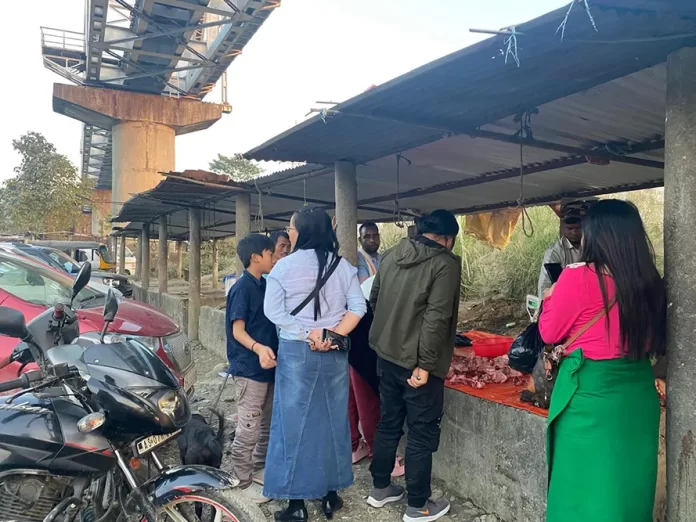
[Indu Chukhu]
On 4 December, 2024, Assam Chief Minister Himanta Biswa Sarma imposed a complete ban on serving and consumption of beef in hotels, restaurants, and public places across the state. This decision, which amends existing laws, aims to regulate beef consumption more strictly in public and commercial spaces. The after-effect of it can be seen here in Arunachal Pradesh, where most of the cattle are brought from Assam.
This reporter reached out to several butchers in the capital region, including Doimukh, who sell beef. Most of them said that the price of cattle has risen over the past couple of months. Commercially, the price of fillet beef per kilo is Rs 350, and its Rs 300 per kilo for beef with bones. Fillet beef is sold by locals for Rs 400, while it is Rs 350 for beef with bones.
A butcher who sells beef in one of the markets in the ICR said he has been procuring cattle from Kakoi (Rajgarh) in Assam for the last two to three months. “Earlier, we used to buy it from Lakhimpur, but due to the shortage in supply, we now have to rely on Kakoi, which is approximately 10 kms away Lakhimpur town,” he said.
When cattle are bought from local people, the price of beef per kilo goes up to Rs 350, he says. The butcher, who did not wish to be named, said that the supply chain has been compromised due to the ban on beef consumption in Assam. “Gai ka daam bar gaya, bohot bar gaya (the price of cattle has risen, skyrocketed),” he said, adding that whoever buys cattle from Assam does so at great risk.
He said that beef butchers have to have separate licenses for their stall and for selling beef. “When we buy the cattle from Assam, we get a slip where all the prices and the numbers of cattle bought are written. This time it is being checked,” the butcher said. “Riks hain Assam se kharidke leke aane me, par kya karega, pet to paalna parega (It is risky bringing cattle from Assam, but we have to sustain our livelihood).”
Another beef seller, Porijul Islam (52), who is in the business of selling beef for the past 30 years, mostly in Doimukh and Itanagar, says that in Assam their vehicles carrying cattle are caught either by the Assam Police or the All Assam Students’ Union. If caught, the penalty can be anything between Rs 3,000 to Rs 50,000, but never below Rs 3,000, he said.
Islam informed that he buys cattle from Arunachali sellers, and in turn he sells fillet beef for Rs 400 a kilo.
Another butcher who sells beef near Emchi in Doimukh echoed the same. “The rate of cattle is rising and we are still adhering to the current rate issued by the district administration, that is, Rs 350 a kilo (with bones,” he said, adding that there is no issue on the part of the locals over beef, even if they do not consume beef.
“If there is less supply, we won’t be able to fend for ourselves and our families,” he added.
During Saturday Market in Doimukh last week, there was only one beef stall, whereas earlier there used to be many beef vendors and sellers in the market.
The central cattle breeding farm of the animal husbandry, veterinary & dairy development department in Nirjuli also sells cattle during government auctions annually, or based on availability. Most of the cattle, particularly oxen, are sold and barren cows are up for the auction. Three-to-four-month-old calves are also sold at the cattle breeding farm.
Composite Livestock Farms Joint Director Dr Taba Heli said that the department has not faced any issue with regard to selling cattle till date.
On 13 July, 2022, the executive magistrate of Naharlagun had issued an order under Section 144 CrPC, directing restaurant owners to remove the word ‘beef’ from their signboards by 18 July, 2022, and had threatened to impose a fine of Rs 2,000 and cancel their trading licence if they failed to remove the word.
After the ban on beef in Assam, a reader had written a letter to this daily, stating that he was shocked to see the development in Assam. “Arunachal is different from Assam. It has many tribes, big and small. Cows occupy a large position in tribal sacrificial rituals. This is their religious custom and also related to their livelihood. Moreover, the majority of Arunachalis have eaten beef since time immemorial, and both beef eaters and non-eaters have been peacefully residing.” the reader had written.
“I hope that Assam’s decree will not affect Arunachal. Any decree of the government should take into account the actual situation of the local people. Beef is just food and should not be given more connotations,” the reader said.




